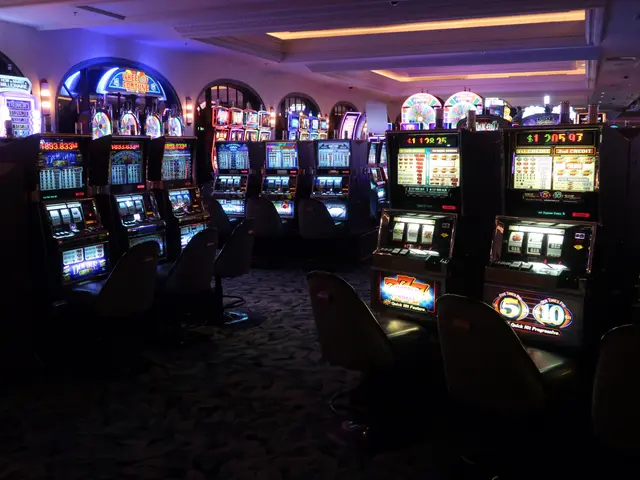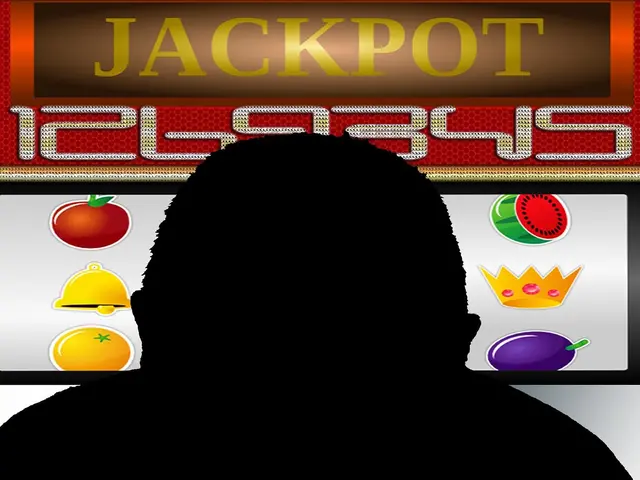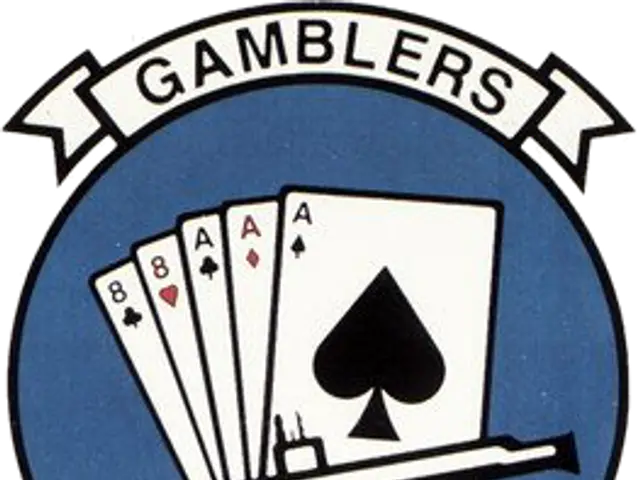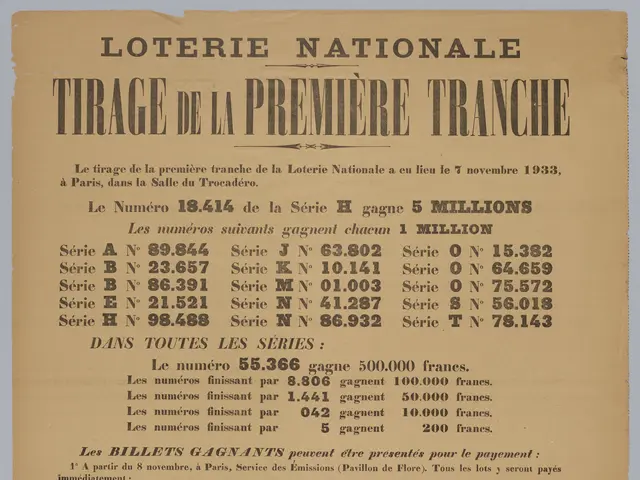Transforming Poker Table Role from Victim to Predator: Strategies and Tactics
In the realm of poker, we've got two mindsets that can make or break your game - the predator and the victim. Picture a wolf chasing a rabbit, and the rabbit simply focuses on survival, while the wolf thinks about how to catch the rabbit. That sums up the difference between the two.
Too many poker players are stuck in the rabbit's shoes, consumed by self-protection and a fear of being exploited. These players are prone to something called "main character syndrome" - they're too blinkered by self-obsession to see their opponents' ranges clearly. They fret about moves that aren't solver-approved, ones that seem aggressive, or those that could theoretically be exploited. But here's the kicker - your opponents don't know about your deviations from the optimal strategy!
To be a winner, you've got to be a predator, not a victim. It's not about nailing down a theoretically sound strategy and sticking to it like glue. No, you need to be one step ahead, relentlessly attacking your opponents' weaknesses, and mercilessly exploiting them. Having a good theoretical foundation is great, studying theory is fabulous, but don't just blindly mimic it at the table.
Taking Pot in Multi-Way Pots
Let's examine some action in this hand:
We've got a crummy table here. Weak player in the big blind - check that out. UTG opens, we tag along from the hijack. Solver might prefer to flat call in these positions less frequently, but hey, it's cool to do it. No cause for alarm when the table is this soft. You lot love simplifying strategies and never making cold calls, but you're wrong. You're the victim, too focused on self. Try thinking about the table situation more!
The flop comes . Everyone checks.
The turn brings and we get two checks, indicating the opponents have definitely capped their ranges. No showdown value for our hand, but it's a situation where our hand has virtually no showdown value, and our opponents' ranges will be capped and underprotected in most games you play, be it NL500 offline or NL25-NL100 online, people will be truly capped here.
So we just start with a bet. The objective here is to put maximum pressure on our opponents on the river. If someone calls, they probably have a hand like for UTG, or for the big blind, something like that, right? The regular on UTG, a preflop raiser, plays the call.
The river brings , a blank for his range - not much flushes, full houses, or anything truly impressive. We just go ahead and bluff.
Now, if you're thinking like a victim, you'd be pondering your value hands, wondering whether it's better to bluff with eights or something with a bubble. Nonsense! There's only a tiny chance you'd be bluffing in these situations, and that's the problem!
This mindset is classic introspection - it's a navel-gazing approach to poker, where you believe your perfectly balanced range is magically tied to your winrate and results. But the truth is, your range doesn't determine your winrate by itself. Your profit comes from specific actions with specific hands against your opponent's range - that's the predator mindset. It's about exploiting your opponent's weaknesses, not about theoretical balance.
So, don't worry about what's "better to have in your hand" - just ask yourself, "will my bluff be profitable?" Only when the decision is on the borderline should we consider blockers. But why do you always jump to building the perfect range? Because you're scared, you're timid. You're manifesting a victim mentality.
Maybe you are playing against such a strong opponent that your position is that of a victim. But come on, that's highly unlikely. In most cases, we're better than our opponents! If we're breaking even despite a 7-8 BB/100 leak, it means we're objectively stronger than the average player at the table. With that advantage, we should be predators, not shy away in perfect balance.
Therefore, embrace the predator mindset. I'm risking 33 to win 18, which is a bit less than 2-x pot, so I need a little less than 66% fold equity for the bluff to be break-even, assuming I never win by checking, and check has EV=0, right? I'd assume it passes about 75-80% of the time. I sincerely believe so. That's my interpretation of this situation.
We've overbet the river, and they folded. And the predator mindset here is simple: "I don't care what my range is". Because what you'll think about my range here will be something really, really strong.
Because I just raised on the turn in a 3-way pot, then raised again on the river - people don't bluff like that, the opponent is absolutely right to fold here without much thought, with or without a bubble. And that's how most regulars would play this situation. The predator mindset is that I can make a +EV play, getting value with my hand against your range.
In this case, I think I'm getting more fold equity than I need with my hand against your range. I'm extracting EV from the pot, like a predator. I'm not thinking about myself. I'm thinking about you. A wolf doesn't think about itself. It's not like, "Oh, if I circle these bushes on the right this time, I'll be more balanced, and then rabbits can't exploit me by running that way."
"In fact, I think I'd hunt that rabbit if my leg wasn't cramping right now. Yes, I'll hunt only when I'm not in pain." No. A wolf doesn't think like that. A wolf just sees, "Oh, that rabbit is vulnerable. It can be caught. I'll catch it." Bam. Eaten. Gone. Dinner served. Happy times. Satisfied wolf. Be the wolf. Don't be the rabbit. Be the predator. Don't be the prey.
Focus on Opponent, Not Yourself
Let me show you 2 more hands, less flashy but crucial for your winrate and your journey to becoming a predator:
There's another mindset that grates on me constantly, and that's "building around". When you build your strategy and range, you're basically setting yourself up to be the prey.
In this situation, you'll hear good poker players say things like, "Well, how did we get here in the first place?" We raised 3-bet from the big blind. Opponent is a weak player, called in CO.
On the turn, I've come, we're playing check and the opponent checks back. And on the flop, you're making people say, "I build my strategy around a third-of-the-pot bet with my range." That's my simplified strategy. That's what I do. That's what I create. It's the temple I'm building for the solver. And I say, "Okay, yeah, a small bet here is normal. Checking is also normal here. I don't know what's better, right?" Let's not spend too much time on this. But checking is clearly not a mistake. On the turn, people say, "I build my strategy around the hand and better. That's what I build my range around."
Yes, understanding the basics is crucial: if you're building a strategy with one bet size, you need to determine the optimal sizing and suitable value hands. Then the same with bluffs. But don't obsess over building your perfect range and prioritize it over scrutinizing the situation - you're thinking like a rabbit. You're becoming prey.
Instead, ask these questions:
- What is my opponent's real range?
- What can I do with that?
- How do I maximize EV against this specific player?
Think like a predator, not prey. Analyze your opponent's weaknesses, not your theoretical flaws.
On the turn, our opponent has very few diamond-x combinations, especially after checking the flop. They likely have:
- Many low pairs
- Some gutshots
- A few flush draws, though they probably would have bet most of those on the flop
And we have . How to maximize profit against this range? Simple - bet an amount that they can call with underpair, worst ace, gutshot. So, we just bet half the pot.
Some call this "custom sizing", like it's some special situation. But against a random recreational player, it's just standard play.
"What's your range building here?" - I don't care. I have , and this hand is worth half the pot against this specific player. I'm confident that this action has the highest EV. It's better than checking because against a passive recreational player who will likely just check back and apply little pressure, we prefer to bet ourselves.
I think a medium-sized bet is better than a big bet here. If I bet 75% of my stack or go all-in, I risk making the classic mistake of over-polarizing my range. But a medium sizing is preferable to a small bet because I can extract more value. My analysis is based on the fact that most players will call here with a wide range of hands, and there's some elasticity between a half-pot bet and a third-pot bet. Therefore, I choose this sizing.
And notice - I don't care what my ranges are. I don't care how "balanced" my overall strategy is. I'm not focused on myself. I'm thinking exclusively about the opponent and maximizing EV in this specific situation against this specific player. That's what it means to play like a predator. Let's act.
The opponent calls, the river is a king. We check, they check back. They had . I think we did a good job of maximizing EV with our hand against their range. That's what we should do. Get into the predator mindset. It's very important.
Trying to Get Max Value
Last hand: we have . Opponent opened from MP, and we defended on the big blind. Flop - we check, they check back. Playing against a regular, by the way.
Turn is - I decide to overbet. Theoretically, there's logic in building a strategy around overbets in these situations. But when I overbet, I'm just thinking this is the best play for my specific hand in this moment.
If I thought there was a better play in this situation, I wouldn't care how my pre-planned GTO strategy looks. I'd just make the play that brings in the most profit.
I won't blindly follow a plan if I see a more profitable opportunity against a specific opponent. The point is to make the most +EV plays, not just stick to a theoretically correct scheme.
Here, I believe this is the best move. The opponent's range will be quite tight. Based on my experience, players in this pool don't check the top pair often enough. Their check range mainly consists of:
- Underpair
- -hands
- -hands
- Occasionally, hands like
I'm just choosing a sizing that's effective against such a tight range. Our hand has very high equity on this wet board. Plus, the opponent will easily call with pocket pairs with draws, like and such.
This is simply a good sizing choice for our hand against his specific range. Here's the key formula:
On the river, a comes. How much is my hand now worth? I think it's quite a lot, although there are certain issues with a large bet. Theoretically, I could say that I'm building a strategy around large value and bluff bets, planning to use overbet mostly. From a theoretical perspective, this makes sense - I've already polarized my range. I've already bet with hands like and stronger. So from an organizational perspective, in terms of my internal range, it's logical to play overbet or check here. But I have a problem with this approach. A small problem, and I might be wrong, but my gut feeling tells me otherwise:
Here's how their actual range looks on the flop. And this changes our approach to the situation. If you're playing on micros, low stakes, or even mid-stakes against an average regular, their range will have a significant imbalance. They simply won't have enough .
Look at the simulation for a large flop bet strategy - you'll see that and are checked with a decent frequency on such a board. But I don't expect this from average players. So, I just reduce the bet size as an exploit and think: "Okay, I'll make the bet a bit smaller because I want to leave the door open."
Maybe this is an overly flexible situation. If considered as an exploit, I don't like this approach for value hands. It might work better as a bluff, considering how capped the opponent's range is.
Here, we're just trying to get a call from specific hands: , , - combinations like that. We want to leave the door open for the opponent to call.
We bet 15.7 BB, opponent calls with . See? I'm completely moving away from worrying about my own strategy. I've finished with "building around" my ideal range.
Yes, theoretical concepts are useful if you're trying to simplify and understand a solver's strategy. However, that's not how you should think against real opponents in real games. I've moved past being fixated on my own range. I've moved past a victim mentality. I've moved past the "main character syndrome" where you're so focused inward that you miss the best way to catch your prey.
Be the wolf, not the rabbit. Focus on your opponent, not yourself. Look for your opponent's weaknesses, not the perfect balance in your own game. I'll leave you with that. Happy hunting!
- In poker, a better mindset to have than the victim is the predator, as the predator relentlessly attacks and exploits opponents' weaknesses, instead of being consumed by self-protection and fear of being exploited.
- Having a good theoretical foundation is valuable, but don't blindly mimic it at the table, instead, be one step ahead and think aggressively about how to catch your prey.
- In taking pot in multi-way pots, it's crucial to focus on the table situation and consider your opponents' ranges rather than simplifying strategies.
- When faced with opponent ranges, strive to maximize EV against specific players, think like a predator, and analyze opponent weaknesses instead of navel-gazing and focusing on theoretical balance.
- In poker analysis, try to focus on the opponent, not yourself, and think about how to get max value from your hands against their ranges, rather than building around a third-of-the-pot bet.























